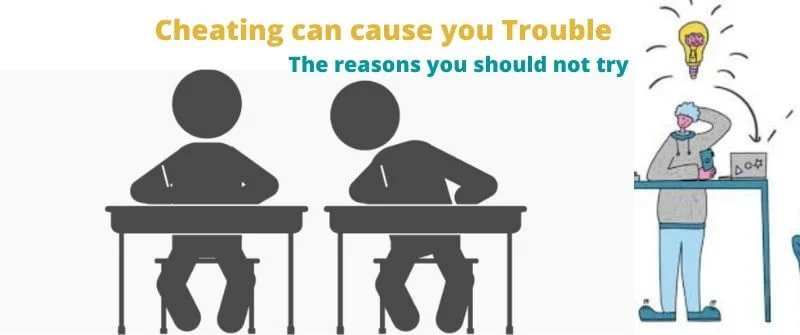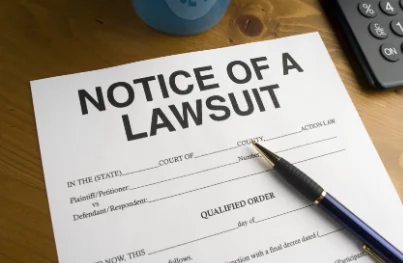Why Cheating in School is Wrong: 15 Reasons and Consequences

In recent times, students have been engaging in cheating, especially in colleges and universities.
However, it is something you should consider not doing. In this guide, we explore all the reasons why cheating in school is wrong and the ethical questions on why you should try to avoid it.
The issue of cheating is diverse, but its main motivation comes from the desire for better grades. There is also a high burden of work.
Students who use our homework help service note that the burden of the assignments is too much. Check our homework help service and learn how to do it better.
However, others earn higher grades and escape the hard work of passing tests fairly. Let us discuss why this could land you in trouble.
We can Write your Papers! No Plagiarism
Get that A on your next essay assignment without the hassles. Any topic or subject. 100% Plagiarism-Free Essays.
Why Cheating in School is Wrong
1. Cheating Hampers Progress
The main reason why we learn is usually to build in the future. When we are learning in various institutions, we obtain several basics. These basics are what we apply in the future to solve the problems we encounter.
If you cheat, you will not know these basics. You will have two options. Either to continue cheating or start learning newly. This becomes a stumbling block to any progress you want to make.
Every student, regardless of their study level, should know that when cheating, you are not learning lessons or skills that could be important later in life.
2. Cheating is not Different from Stealing and Lying

The instructor always expects that every piece of work you hand in was completed through your effort.
When you present the work as your own and know that you cheated, that is lying.
By doing this, you will always take credit for the wrong purposes and may feel guilty.
Cheating becomes stealing when you hand in assignments to your instructor as your own and it belongs to someone else or was done by someone else.
3. Cheating is Unfair to Others
When you cheat, you do not deserve any plaudit. You may feel good after cheating and even get a better grade, but your recognition will be unfair.
When you think of it, it is very unfair to cheat in school and get better grades than your fellow students who studied hard and worked to achieve what they have achieved.
The students also feel bad if they notice. They did everything right and you just found a mechanism to surpass them. It is usually very frustrating when you play by the rules and someone just decides to cheat.
4. Cheating causes Stress
Students think that cheating is easy. It is not. The psychological torture you put yourself into can cause stress. When you decide to cheat, you constantly worry about being caught.
Consequences of cheating may land you into must cross your mind. Whether it’s your parents’ reaction or the disciplinary actions of your school. You even come up with a fake story that you will use to cover up for your actions when caught.
You will always feel insecure if you suspect somebody knows about your cheating and might report you to the administration. All these thoughts are too much to hold into and may eventually cause stress.
5. Cheating in school is unfair to you

The pleasure comes from knowing you completed an assignment or a test independently. You will feel good. Lack of confidence is one of the effects of cheating in college, making it feel unfair to yourself.
You will also build self-confidence in every academic work you do and build your self-esteem too. On the other hand, it feels bad to cheat.
In addition, you may score a high grade on your assignment, but deep down, you will know that you do not deserve it.
When you cheat, you doubt your abilities. You will never find out if you can make it on your own.
6. Cheating Becomes a Habit
When you cheat, you will most probably get a high grade. This will always give you the motivation to cheat again and again.
If you start cheating early in your academics, it becomes a habit and will follow you to high school, colleges, universities, and even in your career. It just becomes a part of you and spreads in everything you do in life.
When you become a cheating addict, it is very unlikely that you will know what is acceptable behavior. Cheating is a demonstration that you disregard others.
7. Eventually, Cheating leads to Course Failure
Success is usually hard to achieve but cheating offers a way out. When you cheat, you usually forego the hard work that every learner must be involved in to succeed.
Hard work instills traits in you that are important in the future. These traits include sacrifice, dedication, persistence, diligence, trustworthiness, and honesty.
It is usually very hard to achieve your goals in the future without these traits. When you are caught cheating in an examination, you fail that examination or even get expelled.
At the same time, failure and bad behavior at school may hinder you from getting a good job in the future.
8. Cheating in College kills Trust

Everyone in institutions is opposed to cheating. You will completely ruin people’s trust in you if you are caught cheating.
The number of times doesn’t matter. One incident of cheating ruins trust.
You may opt never to cheat again but it will be very hard to regain your trust.
Everyone will have a hard time trying to trust you. Even when you submit your work to the instructors, they will always be suspicious and check it thoroughly before giving it back to you.
When people who have witnessed you cheating hear about you cheating again, their opinions will always be compromised, even if you are honest.
9. Cheating is Disrespectful
Cheating is a form of disrespect to our instructors. Instructors sacrifice a lot to see their students succeed. They work very hard, spend a lot of time with students, share knowledge with them, and treat students as their children.
Remember that all this effort is put in because they intend to see their students succeed in academics, careers, and life.
When you get involved in cheating, you have disregarded and disrespected all the instructor’s efforts to ensure you succeeded genuinely. Cheating is also disrespecting your fellow students.
10. Cheating is Embarrassing
Have you ever thought of how people will treat you when you get caught cheating? Your actions are always responsible for how those around you treat you.
Cheating expresses you as incompetent, disrespectful, unintelligent, selfish, lazy, and a person who cannot be trusted. You will feel embarrassed when those around you disregard you.
When you cheat, many institutions are likely to expel you. Think of the embarrassment that this can cause you. Cheating instances are always recorded.
Imagine being barred from reporting to a college and returning home because you cheated in your examinations. You will be seriously embarrassed if you cheat on a test.
11. Cheating makes the next Learning step Harder
When you cheat, you don’t learn and understand the basics. When you cheat in an introduction test, you will find it hard to understand the next topic of study.
This will lead you to cheat again. When you cheat in the final examinations at any level of study, you will find it harder to understand even the simplest concepts in the next level.
For example, when you cheat in your senior examinations and you are admitted to a college to do a course, chances are you will not succeed in this course because it will exhaust your capabilities. Unless you decide to cheat again.
12. In higher education, you can be Sued for Cheating

When you get to a college or university, one of the first things your instructors teach you is always to present original work.
Cheating and presenting work that is not yours can land you in trouble. You can be sued in court for cheating on a paper.
You are accused of copyright infringement. Only the owner of the work can accuse you of copyright infringement.
You must pay the owner for using his work without permission if proven guilty.
13. Cheating in school is a ‘Broken Window.’
The broken window theory dictates that petty acts that show disobedience and instances of not being civilized can cause much more serious crimes in the future.
When small crimes go unnoticed and unpunished, it seems no one is watching. Academic cheating can be easily classified as a broken window. When young students get away with academic dishonesty, they may assume that no one cares.
This can easily lead them to accept that no one will notice when they commit a more serious offense because no one cares.
14. Cheating in college undermines learning
Cheating usually disrupts learning. When a student is given an assignment and gives it to another student to do it for him, he will not learn what the instructor intended him to learn from the test.
Normally when exams are near, students are supposed to learn and revise for the exam. When the student knows he will carry a book to the exam room and copy the exam, he will not learn nor revise the topics involved.
At the same time, when cheating is a shortcut to passing an examination, the students disregard learning activities. While getting good grades is one of the reasons why students cheat, it undermines the learning process.
15. Cheating Devalues Diplomas and Degrees
We should not only look at cheating in schools using the students’ perspective alone. Some schools, mostly colleges and universities, help their students cheat in school to gain credibility and rise through the ranks of top institutions.
This becomes very tricky when it becomes known to the public that the institutions cheat. All graduates from these institutions will suffer.
Their degrees and diplomas become less valuable. They can be fired from their current jobs. Unemployed people will also experience difficulties when trying to secure jobs.
Ethical Questions about Cheating in Colleges
How do Non-cheating Students Perceive it?
Institutions should be concerned about how non-cheating students view cheating. Most students may feel comfortable not reporting those involved in cheating. They see it as normal. Some fear intimidation from others if they report those involved in cheating.

Have Institutions Failed to Enforce Moral Values of Academic Integrity
The importance of curbing academic dishonesty must be considered if all approaches to curb it are to be developed. Morals such as respect, honesty, and self-discipline must be enforced in all institutions.
Are Students Trained in Making Ethical Decisions in Schools?
It is very obvious for a student trained to make ethical decisions to avoid cheating in examinations. Students who tend to cheat will probably engage in misbehavior or make other unethical decisions.
A study on cheating behavior showed that students who cheated in the experimental test are likelier to engage in other behavior that violates school policies. This proves that cheating is part and parcel of moral issues that educational institutions should address.
Institutions should set up seminars to teach students how to make the right decisions and enhance their academic skills.
A Universal Honor Code in Universities and Colleges
We might strive for academic integrity each day of our life but if the disciplinary actions depend on the instructor, we can never progress. Some instructors may favor some students over others.
Some instructors can even be bribed. This means that no action will be taken. The honor code should provide a unison action that is to be taken against anyone involved in cheating in all institutions.
Watch this video to learn more about this.


With over 10 years in academia and academic assistance, Alicia Smart is the epitome of excellence in the writing industry. She is our managing editor and is in charge of the writing operations at Grade Bees.





